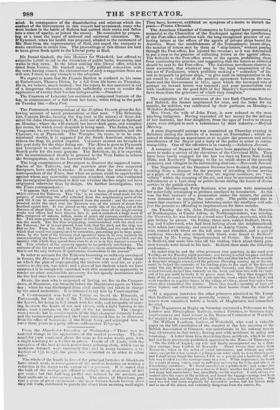The Portsmouth correspondent of the Brighton Gazette gives the fol-
lowing account of naval preparations at that port. "The Britannia, 120, Captain Drake, bearing the flag (red at the mizen) of Rear-Ad- miral Sir John Ommanney, K.C.B., went out of the harbour to Spithead on Monday ; where she will embark her lower-deck guns, and complete her stores, for which every despatch is being used. The Indus, 84, and Vengeance, 84, are being expedited for immediate commission, and the Clarence, 84, at Plymouth. The Warspite, 50, razee, is to be com- missioned shortly, it is supposed for the South American station, to relieve the Stag, 46, period expired. Volunteer seamen are brought to this port daily for the ships fitting out. The ...Etna is gone to Plymouth and Liverpool to collect more, and tenders are sent to the Irish and Scotch ports for the same purpose. The Belvidere, 42, it is expected, will be commissioned shortly to proceed to the West Indies to relieve the Seringapatam, 42, at the Leeward Islands."
The bug examinations at Devonport to discover the supposed incen- diaries of the Talavera, and the searches after the two suspected foreigners, have ended in smoke. It seems from the statement by a correspoudent of the Times, that when no person could be apprehended against whom any reasonable suspicion attached, those who conducted the investigation determined to find out whether the fire might not have originated otherwise than by design. On further investigation, says the Times correspondent- " It appears that what is called a bin' had been placed under the shed which covered the Talavera. This 'bum' is an erection of wood made for the purpose of containing the offal collected from the neighbouring parts of the yard till it can be conveniently removed from the arsenal; and the one con- structed under the shed over the Talavera was of the extent of about four hundred square feet. It was placed on the south side of the ship, and at the distance of about thirty feet from her. The refuse from all the neighbouring works and offices bad been thrown into it, and it contained a large mass of filth, composed of oakum, tallow, waste of paint, old canvass, sawdust, chips, &c. This mass generated a high degree of heat, and spontaneous combustion was the result. The fire thus originating, communicated with the shed over the Talavera; for it is now proved; I am told, that time shed, not the ship, was first on fire. From the shed the Talavera was kindled, and the coal-tar with which that vessel was impregnated to saturation, generating gas in large quan- tities, by the heat of the burning shed operating upon it, an easy medium fir communicating the dames from one part to another was thus provided, and the rapidity with which they spread front stem to stern is in this manner accounted for. This solution of the mystery appears to me perfectly satisfactory. The contents of the bin are exactly such as would give rise to spontaneous flame, and this is not the only instance of spontaneous combustion in the arsenal."
In order to account for the Talavera becoming so suddenly enveloped in flames, the Deronport Telegraph says—" She was one of those ships on which the plan of impregnating the timbers with coal-tar, as a pre- ventive to dry-rot, was tried; and a piece of her timbers which we have examined is so completely saturated with this material as apparently to render no other combustible necessary for bier speedy destruction tiller the fire had once been communicated."
Henty, the man who is suspected of' having set fire to the Camper- down, at Sheerness, was brought before the Magistrates again on Thurs- day ; when he was discharged front civil custody and taken in charge by the naval authorities. It is intended to try him by Court-martial.
A Court-niartial was held on Friday on board the Britannia, at Portsmouth, for the trial of Mr. T. harrow, boatswain, doing duty in the Laurel, for being in bed drunk with his wife, nod incapable of mov- ing, bezween the hours of ten and eleven, with a light burning in his cabin, near a Curtain, on the night of' the 1st instant. The charges
were Froved; but in cote-iteration of the high character formerly borne, and the testimonials produced, the Court sentenced !din to be dismissed from his office of boatswaia in the Royal Navy, and adjudged hint to serve three years as a petty Ian/psi/ire Telegraph.


























 Previous page
Previous page